#cook:やまいも
Explore tagged Tumblr posts
Photo

✿ 米粉と山芋で超モッチリ!お好み焼き ✍️ 米粉50〜100g,桜えび,ソース→中濃ソース大1と1/2+ケチャップ大1/2+オイスターソース小1+砂糖小1/2
#cook:米粉#cook:桜えび#cook:お好み焼き#cook:米粉と山芋で超モッチリ!お好み焼き#cook#cook:2025〜#cook:主食:米粉#cook:お好み焼き:米粉#cook:米粉:お好み焼き#cook:やまいも#cook:ながいも#cook:オイスターソース×ケチャップ×砂糖×中濃ソース#cook:主食#cook:キャベツ#cook:マヨネーズ#cook:オイスターソース×ケチャップ×砂糖×中濃ソース×マヨネーズ#cook:かつお節#2025〜#cook:主食:2025〜
0 notes
Text

こふく:通称こふ、こふちゃん、稀にこふたん、こふたろう、こふくさん、別名脅威の黒猫
2022年7月、約2ヶ月半で保護施設から引き取られた。脱肛しており長くないかもと言われていたが、無事改善しすくすく育つ。
Jさんに日々挑みかかる強気な幼少期を送るも実は怖がりで、たまのお客さんはおろかじいちゃんにすら挨拶したことがない内弁慶。
だっこを嫌い、呼べば逃げ、最近は何を考えているか分からない顔で床に落ちており、家主ですら意思疎通は困難。しかし朝家主が目覚めると枕シェアによる寄り添いサービスを行っており、一定の愛情はあるもよう。
米をこよなく愛し、炊きたてご飯や準備中の餅米をむしゃむしゃと食べる。また物理的に我が道を行くため多くの物を壊し、実はかなり家主に散財させている。
Kofuku: known as Kofu, Kofu-chan, rarely Kofutan, Kofutaro,or Kofuku-san, and the alias is the black menace
He was adopted from the animal shelter when he was around 2months and a half. Although it was said he might not live so long because he had the anal prolapse, now he has no problems and has gotten so big.
He had a violent childhood attacking Mr.J every day, but his nature is only a home tiger so he can't greet with not only her guests but grandpa yet.
He hates being hugged, runs away when she calls him, and falls on the floor with the face that doesn't know what he's thinking these days, so it's still impossible for landlady to communicate with him. She can feel his affection only by his staying beside service with sharing her pillow when she wakes up.
He loves rice SO much and eats cooked rice or prepared mochi rice. And he always goes his way physically,then broke a lot of things at home so he let her spend quite an extra money...
5K notes
·
View notes
Text
Compliments in Japanese
How do you give compliments in Japanese? Japanese tends to be a very 曖昧 (あいまい) or vague language, so direct compliments tend to be less common.
お世辞 おせじ compliment
誉め言葉 ほめことば compliment, praise
Here are some compliments that can be used in most situations.

Appearance・見た目
Polite 髪の毛切りましたか?似合いますね。 かみのけきりましたか?にあいますね。 Did you cut your hair? It looks good on you.
Casual 髪の毛切った?似合うよ。 かみのけきった?にあうよ。 Did you cut your hair? It looks good.
Polite そのシャツ/ワンピース/服いいですね。 そのシャツ/ワンピース/ふくいいですね。 That shirt/dress/outfit looks good.
Casual そのシャツ/ワンピース/服いいね。 そのシャツ/ワンピース/ふくいいね。 That shirt/dress/outfit looks good.
Polite いい笑顔ですね。 いいえがおですね。 You have a nice smile.
Casual いい笑顔だね。 いいえがおだね。 You have a nice smile.
Work・仕事
Polite 良くやりましたね! よくやりましたね! Good job! / Well done!
Casual 良くやったね! よくやったね! Good job! / Well done!
Polite お見事です! おみごとです! Great work! / Excellent!
Casual お見事! おみごと! Great work! / Excellent!
Polite 今日のプレゼン/スピーチ/アイディアとても良かったです。 きょうのプレゼン/スピーチ/アイディアとてもよかったです。 Today's presentation/speech/idea was very good.
Casual 今日のプレゼン/スピーチ/アイディアとても良かったよ。 きょうのプレゼン/スピーチ/アイディアとてもよかったよ。 Today's presentation/speech/idea was very good.
Skill・腕前
Polite 料理上手ですね。 りょうりじょうずですね。 You are good at cooking.
Casual 料理上手いね。 りょうりうまいね。 You are a good cook.
Polite 写真を撮るセンスがいいですね。 しゃしんをとるセンスがいいですね。 You have good photography sense.
Casual 写真を撮るセンスがいいね。 しゃしんをとるセンスがいいね。 You have good photography sense.
Polite 英語がペラペラですね。 えいごがペラペラですね。 Your English is very fluent.
Casual 英語がペラペラだね。 えいごがペラペラだね。 Your English is very fluent.
#日本語#japanese#japanese langblr#japanese studyblr#langblr#studyblr#compliments in japanese#japanese language#tokidokitokyo#tdtstudy
315 notes
·
View notes
Text
YouTube Channels for Kids by JLPT Levels
(。•̀ᴗ-)✧ resources
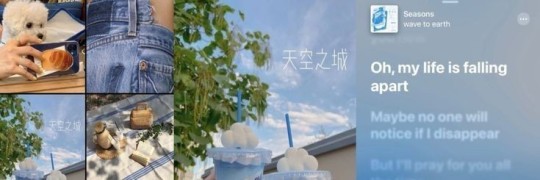
こんにちは, Japanese learners! Learning a language is an exciting adventure, isn't it? To add a spark of joy to your Japanese learning journey, here's a collection of YouTube channels tailored for kids. Organized by JLPT levels, these channels offer a blend of education and entertainment for learners at different stages. Keep in mind, though, that JLPT levels aren't an exact science like math – language learning can be subjective in terms of difficulty. However, these resources provide a fantastic starting point and a fun way to explore the world of Japanese language and culture. Let's hop into this delightful world of animated learning and playful discoveries!
Friendly reminder to adjust your way of learning in order to make the most of what you're studying to reach the goal you truly want! read my post about it (ᵔ◡ᵔ)
꒰ა ˚₊ ✧・┈・╴N 5 ╴・┈・𐑺 ‧₊˚໒꒱
— Curious George (N5 level)
— Japanese folk tales/anime series (Japanese audio/Japanese subtitles) from BomBom Academy (N5 level)
— Peppa Pig (N5-4 level)
— Anpanman (N5-4 level)
— NHK education (N5-4 level)
꒰ა ˚₊ ✧・┈・╴N4 ╴・┈・𐑺 ‧₊˚໒꒱
— Cinnamon Roll, Sanrio (N4 level)
— [Anime] Atashin'chi (N4-3 level)
꒰ა ˚₊ ✧・┈・╴N3 ╴・┈・𐑺 ‧₊˚໒꒱
— Sesame Street Japan (N3 level)
— Chibi Maruko Chan (N3-2 level)
꒰ა ˚₊ ✧・┈・╴N2 ╴・┈・𐑺 ‧₊˚໒꒱
— Precure (N2 level)
またね~@inkichan
꒰ა ˚₊ ✧・┈・╴﹕꒰ ᐢ。- ༝ -。ᐢ ꒱﹕╴・┈・𐑺 ‧₊˚໒꒱
#japanese#nihongo#studyblr#learn Japanese#learning Japanese#japanese langblr#langblog#japanese studyblr#日本語#study japanese#japanese resources#free resources#resources#japanese free resources#youtube#JLPT#JLPT N5
853 notes
·
View notes
Text
Japanese "Onomatopoeia" 『オノマトペ/Onomatope)』
There are two types in Japanese Onomatopoeia. One is 「擬音語(ぎおんご/Gi-on-go)」 which is “written sound” as we hear, and the other is 「擬態語(ぎたいご/Gi-tai-go)」 which is “written sound of status” as we look or feel.
1) 「擬音語(ぎおんご/Gi-on-go)」: “sound” onomatopoeias
As examples, let’s compare onomatopoeias for some animal sounds in Japanese and English.
犬(いぬ/Inu)「ワンワン(Wan-wan)」 Dog: “Woof woof” “Bow-wow”
猫(ねこ/Neko)「ニャー(Nyaa)」 Cat: “Meow”
牛(うし/Ushi)「モー(Moo)」 Cow: “Moo”
豚(ぶた/Buta)「ブーブー(Buu-buu)」 Pig: “Oink oink”
にわとり(Niwatori)「コケコッコー(Kokekokkoo)」Rooster: “Cock-a-doodle-doo”
2) 「擬態語(ぎたいご/Gi-tai-go)」 “status” onomatopoeias
This type is onomatopoeias of “status”. An easy-to-understand example is “わくわく(Waku-waku)” which became famous through “SPY x FAMILY.” “Waku-waku” means being excited or thrilled about something you look forward to. Although the status does not have that sound, we can imagine Anya’s facial expression and emotions just by seeing the word.
By using onomatopoeias, we can describe the situation or the person’s feelings in detail with simple and short words. For example, if you want to say “It’s raining,” here are some onomatopoeias, from the lightest to the heaviest;
①「雨(あめ/Ame)がポツリポツリ(Potsuri-potsuri)と降(ふ/Fu)っている」…Raindrops are falling at intervals.
②「雨がポツポツ(Potsu-potsu)降っている」…Just a few raindrops are falling.
③「雨がパラパラ(Para-para)降っている」…Raindrops are falling continuously
④「雨がしとしと(Shito-shito)降っている」…It’s quiet, but certainly raining continuously.
⑤「雨がザーザー(Zaa-zaa)降っている」…It’s raining hard and making a fair amount of noise.
⑥「雨がドシャドシャ(Dosha-dosha)降っている」…It’s raining dangerously hard.
Onomatopoeias have existed since before manga and anime existed, but manga has made us more familiar with them, and they have enabled us to share delicate expressions with visual images using just a few words. So I think you’ll be familiar with them naturally while watching anime or manga, without extra effort to memorize them.
Hereunder I’ll pick up some lines with onomatopoeias from Season 1 episodes;
―――――――――――――――――――――――――――
From Episode 1 : Maomao
猫猫「たかがウワサ話に何を真剣になってるんだ。こんなのは、ただの憶測にすぎない。すぎないが…ちいとばかし、行ってみるか。そそそそそ…」
Maomao “Takaga uwasa-banashini nanio shinkenni natterunda. Konnanowa tadano okusokuni suginai. Suginaiga…chiito-bakashi itte-miruka. Sososososo…”
Maomao “Why am I taking a rumor so seriously? It’s all just conjecture. But still… I guess I can take a quick peek.”
Episode 13 : Serving in the Outer Court
壬氏「勉強の方はやっているのか?」
Jinshi “Benkyono-howa yatte iru-noka?”
Jinshi “Are you studying?”
猫猫「そそそそそ…」
Maomao “Sososososo…”
Maomao “Sneak, sneak.”
壬氏「おい!」
Jinshi “Oi!”
Jinshi “Hey!”
猫猫「そそそそそ…」
Maomao “Sososososo…”
Maomao “Sneak, sneak!”
「そそそそそ…」: sneak, sneak. (This onomatopoeia might be newly created in this anime.)
―――――――――――――――――――――――――――――――
From Episode 4 : The Threat
猫猫「ぴょーん、ぴょん。仕方ない。もう一度、作り直すか」
Maomao “Pyōn, pyon. Shikata nai. Mo ichido, tsukuri-naosuka.”
Maomao “Boing boing. Oh, well. Guess I have to cook it again.”
「ぴょん(Pyon)」: Jumping, 「ぴょーん(Pyoon)」: Jumping (higher or longer)
―――――――――――――――――――――――――――
From Episode 5 : Covert Operations
やぶ医者「お待たせしました、壬氏さ…しゅん」
Yabu Isha “Omatase shimashita, Jinshi-sa……Shun.”
Quack Doctor “Thank you for waiting, Master Jinshi- Oh.”
「しゅん(Shun)」: Get disappointed and depressed a little
―――――――――――――――――――――――――――
Episode 6 : The Garden Party
貴園「実際、若いの。だって、主上様を産んだのが…こしょこしょこしょ」
Guien “Jissai, wakaino. Datte, shujo-samao unda-noga… Kosho-kosho-kosho.”
Guiyuan “She is young. She gave birth to the emperor when she was…”!”
「こしょこしょ(Kosho-kosho)(with more comical nuance)」「こそこそ(Koso-koso)」: Talking in secret
―――――――――――――――――――――――――――
From Episode 6 : The Garden Party
桜花「ムカ~ッ!」
Infa “Mukaaa!”
Yinghua “Grr!”
桜花「キ~ッ!猫猫に謝りなさいよ!!」
Infa “Kiii! Maomaoni ayamari-nasaiyo!!”
Yinghua “Apologize to Maomao!”
「ムカッ(Muka)」 「ムカーッ(Mukaa)」「キーッ(Kiii)」: Getting angry
―――――――――――――――――――――――――――
From Episode 6 : The Garden Party
猫猫(へえ…こうして見ると、な��なか…。思ったより、お偉いさんなのか。やはり、武官に交ざっても違和感がない。
へえ、さっきの武官も、末席だが、年齢を考えると出世頭か?あのキラキラした宦官はいないけど、まあ、どうでもいい。おっ、それより毒見だ)
Maomao (Hee… Koshite miruto, naka-naka… Omotta-yori, oerai-san nanoka. Yahari, bukanni mazattemo iwakanga nai. Hee, sakkino bukanmo, masseki-daga, nenreio kangaeruto shusse-gashiraka? Ano kira-kira shita kanganwa inai-kedo, maa do demo ii. O, soreyori, dokumi-da.)
Maomao (He looks pretty good there. I guess he’s higher up than I thought. He doesn’t seem out of place among the military officers. Oh look, that officer from earlier. He’s at the very edge, but given his age, I guess that’s still impressive? Our glittering eunuch isn’t there, but who cares? More importantly, food tasting.)
猫猫(…新しいかんざし。宦官もかんざしをもらうのか。そういえば、襟も少し乱れてる。いつものキラキラさもない。うっ、宴席で姿を見ないと思ったら、そういうことか。でも、今なら年相応の青年に…というか、だいぶ幼く見える。こちらのほうが、まだいいな)
Maomao (…Atarashii kanzashi. Kanganmo kanzashio morau-noka. So-ieba, erimo sukoshi midareteru. Itsumono kira-kirasamo nai. U, ensekide sugatao minaito omottara, so-iu Kotoka. Demo, imanara toshi-so’o-no seinenni… to iuka daibu osanaku mieru. Kochirano-hoga mada iina.)
Maomao (A new hairpin? So the eunuchs gets hairpins, too? His collar is a little disheveled, too. Plus his normal glitter is gone. Is that why he wasn’t at the party? But right now, he’s acting his age more than usual… Or rather, he looks quite a bit younger. I prefer him like this, somewhat.”
猫猫(しおらしい。無茶なことを言っているのは承知の上か。いつも通り、無駄にキラキラしてればいいのに。ここ最近の壬氏様は、以前よりもずっと子供のように見えて仕方ない)
Maomao (Shiorashii. Muchana koto’o itte-irunowa shochino ueka. Itsumo-doori, mudani kira-kira shitereba iinoni. Koko saikinno Jinshi-samawa, izen-yorimo zutto kodomono-yoni miete shikata-nai.)
Maomao (How modest. He realizes he’s asking for the impossible. He should just be excessively shiny like his usual self. For a while now, Master Jinshi has seemed much more childish than before.)
―――――――――――――――――――――――――――――――
From Episode 7 : Homecoming
猫猫「チョキチョキチョキ…カチャカチャカチャ」
Maomao “Choki choki choki… Kacha kacha kacha.”
Maomao “Clip clip clip. Clunk clunk clunk.”
―――――――――――――――――――――――――――――――
From Episode 7 : Homecoming
猫猫「シャーッ!」
Maomao “Shaaaaa!”
Episode 14 : The New Pure Consort
猫猫(ハッ!大事な教材を見せるわけにはいかない!)「シャーッ!」
Maomao (Ha! Daijina kyozai’o miseru-wake-niwa ikanai!) “Shaaaaa!”
Maomao (I can’t let him see my precious teaching material.)
シャー!(Shaaa!) : Hissing sound of cats or snakes. It can also show water flowing or something else, depending on the situation.
―――――――――――――――――――――――――――――――
Episode 12 : The Eunuch and the Courtesan
壬氏「どよどよ…いじいじ…じめじめ…」
Jinshi “Doyo-doyo… Iji-iji… Jime-jime…”
Jinshi “Wah, wah, boo-hoo, sob, sob…”
「どよどよ…」: Negative aura stagnates around there.
「いじいじ…」: sulking
「じめじめ…」: humid, muggy, gloomy mood
These words express how depressed Jinshi is, and he isn’t actually crying. I guess they’re translated into “Wah, wah, boo-hoo, sob, sob…” since there was no suitable short word.
―――――――――――――――――――――――――――――――
From Episode 13 : Serving in the Outer Court
白鈴「フフッ、つやつやのぷるぷるに仕上げておいたから」
Pairin “Fufu. Tsuya-tsuyano puru-puruni shiagete oita-kara.”
Pairin “We got her all dolled up for you.”
「つやつや」: glossy, shiny, dewy
「ぷるぷる」: jiggly, texture like a jelly
―――――――――――――――――――――――――――――――
From Episode 13 : Serving in the Outer Court
猫猫(この間やけど薬の実験したから、ぐちょぐちょなんだよな~。しみる~!)
Maomao (Kono aida yakedo-gusurino jikken shita-kara, gucho-gucho nan-dayonaaa. Shimiruuu!)
Maomao (I just tried out some burn medicine the other day, so it’s really messed up right now. Stings!)
「ぐちょぐちょ」: wet and dirty, soaked and dirty
―――――――――――――――――――――――――――――――
From Episode 15 : Raw Fish
猫猫(フグの毒…!あのピリピリした痺れがいいんだ…ああ、食べたい)
Maomao (Fuguno doku…! Ano piri-piri shita shibirega iinda… Aa, tabetai.)
Maomao (Pufferfish poison… I love how it tingles and stings. Oh, I really want some now!)
―――――――――――――――――――――――――――――――
From Episode 18 : Lakan
猫猫(何の薬だろう…?)「フン…ぺろり」(…芋の粉か?壬氏様の薬だよな?)
Maomao (Nanno kusuri daro…?) “Fun…Perori.” (…Imono konaka? Jinshi-samano kusuri dayona?)
Maomao (I wonder what kind of medicine this is.) “Lick.” (Potato flour? This is for Master Jinshi, right?”
―――――――――――――――――――――――――――――――
From Episode 21 : How to Buy Out a Contract
猫猫(こういうのはベラベラ話さないんだな)
Maomao (Ko-iunowa bera-bera hanasa-nain-dana.)
Maomao (So, he doesn’t blab about that.)
―――――――――――――――――――――――――――――――
From Episode 21 : How to Buy Out a Contract
やぶ医者「んん…似てなくもないねえ。唾液を混ぜたら、糊もドロドロじゃなくなるのかねえ」
Yabu Isha “Nn…Nite-nakumo-nai-nee. Daeki’o maze-tara, norimo doro-doroja nakunaru-noka-nee.”
Quack Doctor “Hmm, I suppose so. Maybe mixing saliva into glue would make it less sticky as well.”
「ドロドロ」: muddy, thick, with a nuance of “dirty”
―――――――――――――――――――――――――――――――
Episode 22 : Blue Roses
小蘭「大丈夫だよ~。ぽい!」
Shaoran “Daijobu dayooo. Poi!”
Xiaolan “It’s fine.”
「ぽい!」: light tossing or throwing small thing away
#apothecary english#apothecary romaji#the apothecary diaries#apothecary diaries#learning japanese#japanese#薬屋のひとりごと#薬屋のひとりごと 英語#薬屋 英語 学習#japan#KNH
68 notes
·
View notes
Text
Learn Japanese with Easy Story!
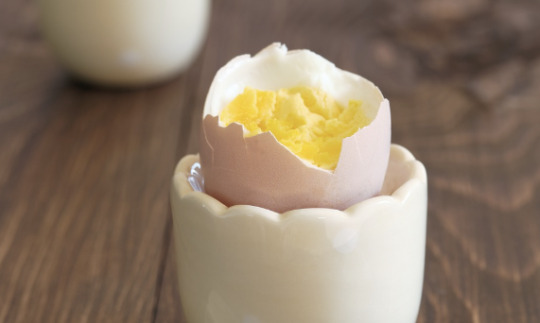
ゆで卵の作り方を学ぼう! Yude tamago no tsukurikata o manabou! Let's learn how to make a boiled egg!
とても簡単だよ。 Totemo kantan da yo. It's very easy to do.
まず、卵を一つ選んでね。 Mazu, tamago o hitotsu erande ne. First, pick an egg.
卵が割れていないか確かめてね。 Tamago ga wareteinai ka tashikamete ne. Make sure the egg is not broken.
次に、卵をお湯の中に入れてね。 Tsugi ni, tamago o oyu no naka ni irete ne. Next, put the egg in a pot of boiling water.
約10分間、ゆでてね。 Yaku 10-punkan, yudete ne. Let it cook for about 10 minutes.
そのあと、卵を気をつけて取り出してね。 Sono ato, tamago o ki o tsukete toridashite ne. After that, take the egg out carefully.
殻をむいたら、ゆで卵ができあがり! Kara o muitara, yude tamago ga dekiagari! Peel off the shell, and your boiled egg is ready! Learn with CrunchyNihongo.com -> https://bit.ly/2Zk4l4K
まなぼう (manabou) – let's learn えらんで (erande) – choose (te-form of えらぶ) われていないか (wareteinai ka) – is not broken (negative form of われる / wareru) たしかめて (tashikamete) – check (te-form of たしかめる / tashikameru) いれて (irete) – put (te-form of いれる / ireru) ゆでて (yudete) – boil (te-form of ゆでる / yuderu) きおつけて (ki o tsukete) – carefully (te-form of きをつける / ki o tsukeru) とりだして (toridashite) – take out (te-form of とりだす / toridasu) むいたら (muitara) – after peeling (tara-form of むく / muku) Learn with CrunchyNihongo.com -> https://bit.ly/2Zk4l4K
ゆで たまご (yude tamago) – boiled egg つくりかた (tsukurikata) – how to make / method かんたん (kantan) – easy たまご (tamago) – egg ひとつ (hitotsu) – one (used for counting things) おゆ (oyu) – hot water なか (naka) – inside やく (yaku) – about (used when talking about time) ぷんかん (punkan) – minutes から (kara) – shell できあがり (dekiagari) – finished, ready (from できあがる / dekiagaru)
Learn with CrunchyNihongo.com -> https://bit.ly/2Zk4l4K
#nihongo#jlpt#japan#nippon#japanese#kanji#hiragana#katakana#hiragana reading practice#hiragana practice
59 notes
·
View notes
Text
沖縄県の那覇市公設市場。沖縄で食される魚介類や肉類が売られています。1階で購入して2階で調理してもらうこともできるようです。貝好きにはたまらない、新鮮な栄螺(さざえ)。写真は無料でダウンロードできるようにしていますので自由に利用してください。
"Naha City Public Market in Okinawa. It sells seafood and meats commonly consumed in Okinawa. You can purchase items on the first floor and have them cooked on the second floor. For shellfish lovers, the fresh turban shells (sazae) are a delight. The photos are available for free download, so feel free to use them."
57 notes
·
View notes
Note
I wanted to ask you this since your post about bishies haha because it remind me how there is not a discussion about how female characters are or look unrealistic compared to how unreal anime men in media aimed at women are or look, in fact there is not a distinction in how women are physically portrayed in media aimed at men or media aimed at women.
Do you think there is a reason for this? I mean the distinction of something ‘good and realistic’ vs bl?
I don't watch TV dramas, but an artist I follows rtd this; 「東京サラダボウル」在日外国人の人々への偏見を解くだけでなく、警察内部でのゲイカップルの存在を真摯に描いていて驚く。BLや笑いに逃げず、極端なラブシーンを描かずともちょっとした触れ合いで2人の関係性が如実に伝わって来る演出がリアルでいい。日本のドラマで今まで無かったんじゃないか?
And I don't know if the translator is betraying me, but I think the person is praising how drama doesn’t ‘run away with BL or laughter’ and I suppose it refers to the fact that the drama is not trying to appeal to a BL ¿fanbase, aesthetic? but a realistic one.
I know that BL does not reflect gay life realistically, but it's interesting? how a praise for gay dramas (or even for BL mangas) is how separate they feel-are from the genre.
I ask mostly because this type of sentiment is not something I see people who like yuri or straight romance bring up At All.
The ‘Realistic Homosexual Relantionship’ tag on Baka Updates is 90% BL mangas, works like Hanamonogatari or She loves to cook She loves to eat doesn’t have it.
Finally this is just pure hatred but it’s really infuriating how men(and women) into bara will make fun of women for being into bishies but they themselves are solely into moe, lolis or bishoujos and have 0 interest in looking for art with female characters who look realistic.
oh we're not doing all that!
the reason for the "good wholesome realistic media VS oohh evil gooners having unrealistic fantasies" debate is that vanilla people always want to act morally superior for being vanilla. it's not deep.
we're all drooling n panting at cartoon drawings so i think everyone need to humble down a little. this also includes girlies who like yoi and kuroshit somehow thinking they're morally superior to straight male otakus btw. it goes both ways.
i personally don't care for "realistic" BL. it doesn't mean it's better or worse than the BL i personally like, it's just not for me.
tl;dr anyone who act judgemental of someone else's preferences is lame and insecure

#to be perfectly honest. as a gay man who's not into bara & with plenty of non-straight fujoshi women in my circle#i get so weary of any debate using the completely inaccurate representation of the BL fanbase as#“het women who like bishies and gay men who like gengoroh tagame. and that's IT”
15 notes
·
View notes
Text
MPW Ep 2 Subtitle Corrections
Subtitle Corrections: Ep 1 here
Cultural/Language Tidbits: Ep 2 here
Same translation disclaimer applies. Thanks to everyone reading the first post and geeking out with me in the notes, I really appreciate it XD Ok, Ep 2, let's go! Sorry in advance for the length!
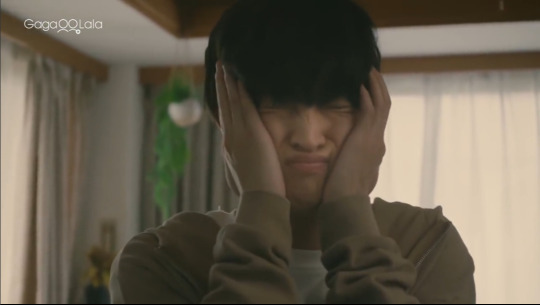
If you're wondering why Yoh's freaking out about the rainy season even though they've been together for 3 years, the manga artist posted a clarification on twitter:
By the way, “it’s been 3 years since then” – that phrase refers to it being 3 years since that conversation regarding the slave contract. As for living together, they’ve only just started (to do so) around Mar/April*, so (at this point) it’s only been a few months (for them). What if (I) got it wrong…. I remember making a note of it, but the file that I wrote it in and passed over (to the crew) couldn’t be found right, so… (was it) a dream?” *Japan's rainy season comes around June/July, so this means that this is the first rainy season these two have been experienced together.
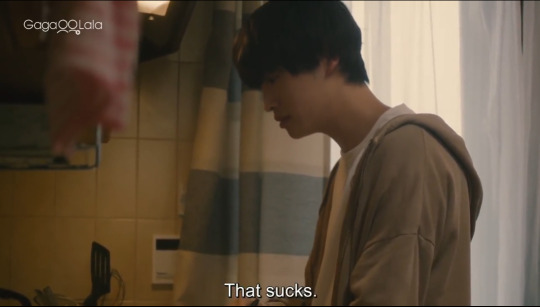
[Y: まずっ] Y: Tastes bad In case the original "that sucks" sounds like Yoh might be talking about the news of the young forecaster - he's really just talking about the food here.
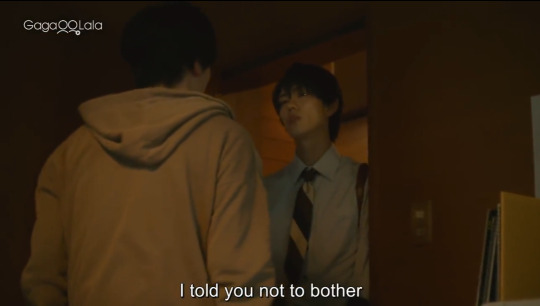
[S: 遅くなるからいらねぇっつっただろう] Original: I told you not to bother since I returned late Mine: I told you I wouldn't need it cause I'd be late right? This is actually a pretty harsh sounding line tbh. It's sort of inkeeping with Segasaki's curtness, but still pretty harsh - so this tells us he's tired after a long day, and explains the frown on his face that Yoh just wipes away with his cuteness

Nikujaga literally means meat and potatoes. It's a stewed dish and a very well-loved comfort food. Super easy to make too (link goes to an easy to follow recipe, and the site also explains a little about the dish).
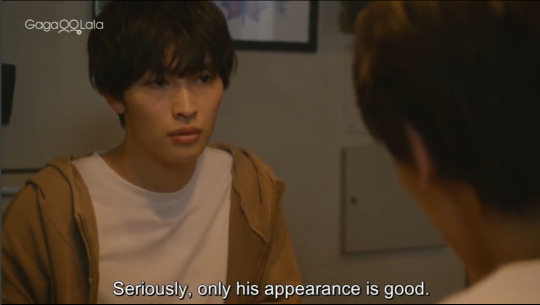
[Y: 本当、顔だけはいいよな] Y: Really, it's only his face that looks good.

I've talked about this in my cultural/language tidbits for this episode (linked up top) but I'll add it here for completion's sake
[Y: あ、いや。なんでもない…です*] (Ah, iya, nandemonai…desu*) Y: Ah, no, it's….nothing* Yoh let's his sentence trail off before tacking on a "desu" at the end. "Desu" is an ending verb characteristic of "polite" speech, which Yoh doesn't use frequently with Segasaki (in fact, by this point, he has not used polite speech with Segasaki at all, except for maybe saying the full form of the word "welcome home", and even that's pushing it). Here he adds it at the end as an afterthought (the polite form of "iya" would be "iie", if he had wanted the whole sentence to be polite from the get go), which tells us that Yoh's feeling a little off-kilter here, and does introduce the slightest distance between him and Segasaki. We'll see this distance increase as the episode goes on.

[Y: いや、どう考えても食べ過ぎだろう] Y: No but, no matter which way you look at it, (he's) eaten way too much hasn't he? Btw, if your hair started standing at the spoon scraping the pot - in the manga artist's post about visiting the shooting venue (as well as during Ep 1 twitter space) it was mentioned that Mashiko, the actor, can actually cook, so during filming they had to tell him what someone who can't would likely do, and also asked him to do the housework poorly (because Yoh's not supposed to be good at cooking or housework hahaha)
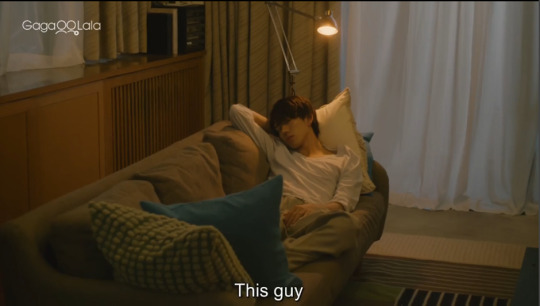
この人*、明日も朝早いんだよな。たぶん。 Original: This guy, has an early morning again tomorrow. Probably. Mine: This person*, has (to leave) early tomorrow morning too. Probably. *The word here is "kono hito", literally "this person". There's actually nothing wrong with the translation "this guy" tbh because that's a fairly neutral term in English, but I'm highlighting it here because in his monologues, Yoh usually refers to Segasaki using much rougher language, such as "koitsu, aitsu", except when he addresses Segasaki directly in his head. I'll talk more about how Yoh addresses Segasaki in the analysis post, but for now - this sentence hints that Yoh has clocked Segasaki's tiredness (subconsciously or not) and is feeling a little bad for him. Then again he quickly hides that by adding on "probably". (Adding the word "probably" behind your sentence is a common way to express doubt/negate what you just said, and incidentally is commonly used by comedians to deliver a punchline).
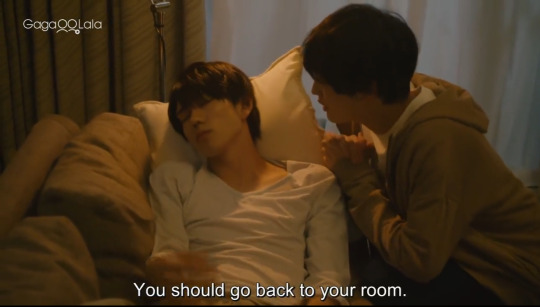
[Y: あの*…あの…寝るなら部屋でとおもって。] Original: Um… Hey… You should go back to your room. Mine: Um*... Um... if you're going to sleep then, (it would be better to sleep) in your room - at least that's what I thought...
*"あの…" (ano…), translated as "um" here, is a common sound you use when you want to get someone's attention but don't want to sound too demanding - it actually isn't being polite per se, but it does show the hesitancy with which Yoh approaches him. Contrast this with the way Segasaki gets Yoh's attention (so far it's just been "Yoh" or "Oi" - the latter of which you would NOT use unless you were close to the person, or looking for a fight).
As a general rule of thumb, the level of politeness in Japanese is directly correlated with the length of the sentence and just how far you can beat around the bush. So, Yoh's suggestion that Segasaki goes to sleep in his room is literally just "if sleeping, then room..." and everything else in that translation is assumed. He may not being using polite speech forms here (that would be "to omoimashita" instead of "to omotte") but this is still a common way to be polite because he's making a suggestion that is so mild Segasaki can choose to ignore it. This is a great example of Brown & Levinson's "negative politeness" which we'll revisit when analysing their speech patterns, and which you can read about in entirely too much detail here (free to read).
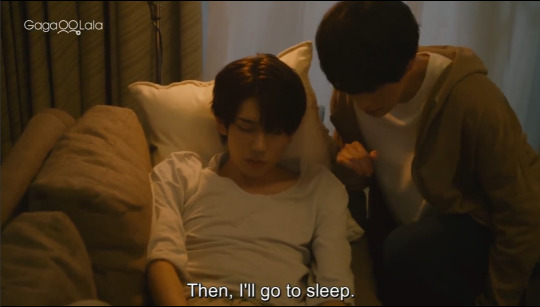
[Y: じゅあ、俺は寝るので** あの、その、そういうことで、おやすみ] Original: Then, I’ll go to sleep. That…sort of thing. Good night. Mine: So then, I'm going to bed, therefore**... Um... that... with that... night!
"Therefore" is an awkward translation for the word ので (node), which is more often translated as "so". I've chosen to use that word because "node", whilst again not a polite form per se, is less colloquial than the more commonly used "から(kara)", to mean the same thing. It tends to pop up more in writing than in speech. "Therefore" doesn't make a sentence polite/formal in English, but it's definitely less colloquial than using the word "so". The use of "node" is just that tiny bit out of place in this sentence paired with the informal pronoun "ore" for "I" as opposed to the more formal choice of "boku".

Again, Yoh answers Segasaki properly here with a "はい (hai)" as opposed to his usual "un" (which is a sound that expresses agreement), when told that Segasaki will be late again. There actually aren't very many moments where Yoh does speak politely to Segasaki (he's definitely rude when he talks about Segasaki in his head hahaha), so these moments stand out. This whole short exchange, together with the random -desu he added earlier, just make Yoh's sentences a little more stilted/awkward, and more distant. Individually they don't deserve much mention at all, but together, and in the context of his jealousy, show just how unsure Yoh is about where he stands with Segasaki.
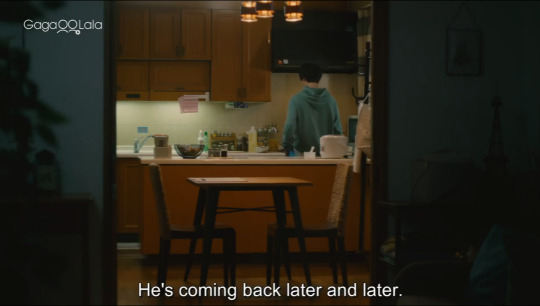
[Y: あの人の帰宅が遅くなり] Y: That person returned home later and later
"That person" - similar to the above usage of "this person". This sentence is incomplete - the verb form of the last word - 遅くなり (osokunari) indicates that there should be a second part to the sentence (the "completed" form would be osokunatta). But after he says this, there is a pregnant pause, as Yoh puts his phone down and continues cooking alone. The pause continues all the way into the next scene, before the sentence continues, highlighting the loneliness that Yoh feels.

[Y: 当然、触れられることもないままに] Original: Of course, he did not touch me at all Mine: (and) of course, (I) remained untouched (by him) as well
The literal translation for this would be "(the situation in which I) was not touched (by him) continued on as well". Yoh uses the passive form of the word "touch", which places the emphasis on Yoh "receiving" the action of being touched as opposed to placing the emphasis on Segasaki "carrying out" the action of touching Yoh. Consider the difference between the sentences "I was hurt by him" and "he hurt me". The former is the passive form, and is super common in Jp, much less common in Eng. If this is confusing - welcome to Jp grammar just know that the emphasis of this line is more on what Yoh does not have, rather than what Segasaki has not done. It accentuates Yoh's feelings of emptiness and loss.
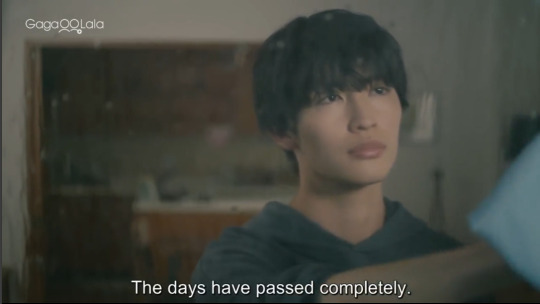
Y: すっかり日々は過ぎて Y: The days pass by completely ...
Similarly, this sentence is "incomplete", and is instead continued by Segasaki walking in and telling Yoh he'll be late again. (This whole bit just hurts my soul tbh, Yoh is so lonely. )
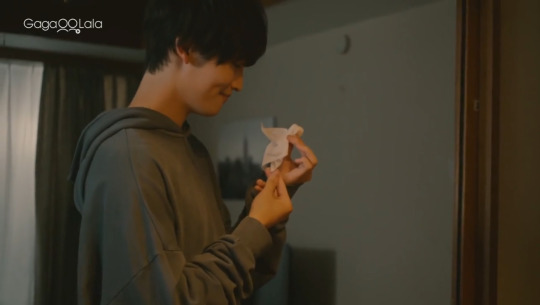
This is a teruteru bouzu aka a charm of sorts for good weather. See the cultural tidbits post for Ep 2 linked up top for more info!

This is said really strongly, and gives the "what the hell are you doing" feel. Yoh's truly upset here.

I try not to care about some of the subs in these side conversations because they don't add much to the main story and these posts are already too long, but this sentence should really be "Dammit, maybe I should (go) troll the chat" (and the previous sentence should be "If this was broadcasted in a certain country it would be instant death" aka N.Korea ^^;) and I just think it was a nice touch to hint at the fandom wars/flaming that goes on between fans hahaha
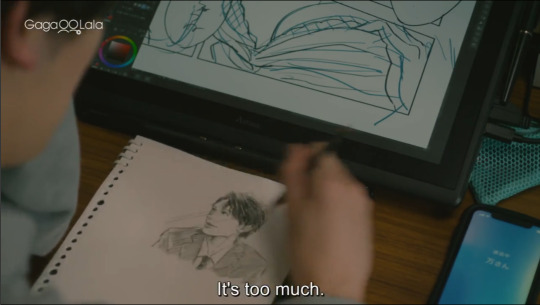
[Y: しんどい] Y: This is too draining The word here used is "shindoi", which is a term used when you're feeling mentally/physically exhausted/drained, and carries a sense of frustration (at feeling this way) and sometimes (emotional) pain.
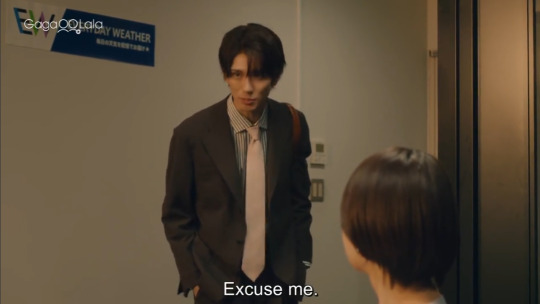
This. Is. Huge. Segasaki does 2 things here - one, he rejects an after-work meal, which you rarely do because Japan is all about the group and rejecting a group invite, to welcome a new member, can make you seem like you aren't a team player - two, the guy who invites him is his senior, which you can tell because Segasaki sticks to polite speech forms whilst the other guy does not. It's still relatively casual, so you can tell he's got a good working relationship with them (probably why he's not worried about rejecting them) but still. In Segasaki's world, Yoh is the No. 1 priority.
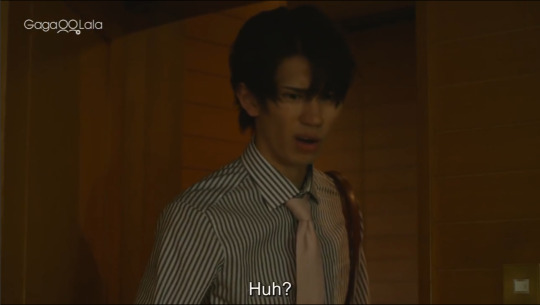
This is more accurately "WTF". There are many sounds in Japanese that aren't exactly words, but carry a lot of meaning - "Haa?!" is one of them, and is a very rude way to express a lot of anger and shock. Please, never say this in real life. You will royally piss off whoever it's directed at and if you are outside a Shibuya bar you will get punched.
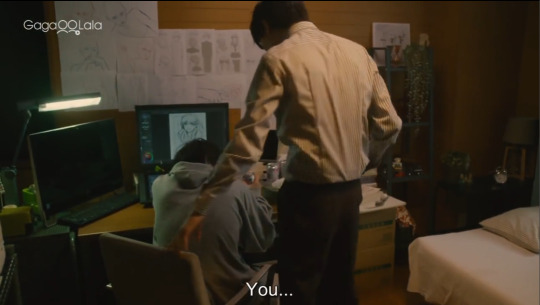
The word used here is てめぇ (temee), which is a really rude way to say "you", and has the same energy as "you bastard". Segasaki usually uses the informal pronoun "omae" for "you" when he talks to Yoh, he's definitely pissed off here.

This is the same word, "shindoi" again.
I'm going to put the rest of the whole argument here with just my translation because it's too long to screencap the whole thing.
[S: 何なんだよ?このエロい惨状は Y: うるさい。 Y: 俺は売れっ子エロ漫画家になるんだ S: なんだそりゃ。おい *takes away beer can* Y: 売れっ子さんが シコリながらネーム描くと いいのができるって言ってた S: なんも描けてなかったぞ。 S: おい、だめだっつってんの S: 飲みすぎ 出すもん出して 寝てただけだろう Y: 黙れ! Y: 俺はエロくて 抜ける漫画描いて いっぱい稼いで Y: 早く こんなとこ出ていくんだ S: はあ? おい、お前 どういうつもりだよ Y: どうもこうもないよ! Y: 平気で抱かれてると思うなよ 。 Y: 俺のこと、好きでもないくせに Y: 便利な奴隷としか思ってないんだろう?そんなにやりたきゃ隣のキャスターとやってろよ S: お前 さっきから 何を... Y: 俺はあんな風に笑いかけられたことない]
Breakdown: S: What's up with this? This lewd disaster of a scene Y: (You're) annoying! ["うるさい (urusai)" is often translated as "shut up", but it literally means someone is being "noisy", and here is more of a complaint that Segasaki is being bothersome] Y: I'm going to become a hot-selling erotica manga artist! [the word used here is 売れっ子 (urekko), which literally means "someone who gets huge sales" and mostly refers to idols, entertainers, TV personalities etc. So Yoh is not just saying he's going to become popular, he's saying he's gonna be like a celebrity manga artist, which is why Segasaki snorts a little at this] S: What's with that? Hey. *takes away beer can* Y: The hot sellers say that if you jerk off whilst drawing your storyboard, you'll come up with good stuff [urekko-san is a pretty cute way of referring to these popular artists] S: You've not drawn anything, you know? [this is said with a really indulgent air, which contrasts directly with the more authoritative tone of the next line] S: Hey, I'm telling you no more *grabs beer can* S: You drank too much. You just shot what you shot and then went to sleep didn't you? [And this is back to an indulgent tone - also, everyone knows Segasaki is talking about cumming here, he just doesn't actually say it so directly] Y: Shut up! ["黙れ (damare) - contrast with "urusai" earlier. The former is used much less commonly and really does mean to "be quiet". This is why Segasaki pauses and looks at Yoh. Up until now Segasaki just thinks Yoh's gotten drunk and is whining cutely, but this word means things are serious.] Y: I'm going to draw manga that is erotic, that you can wank off to, and then earn lots of money [this is a call back to the conversation with Man-san over the phone in Ep 1, which I did not include earlier because I didn't think it was important to the story when Yoh says "the work that was released last month was amazing! There was a big buzz around the topic "I can't wank off (to this)" - Yoh was being sarcastic here, meaning that he got reviews that his work wasn't erotic enough] Y: and leave this sort of place soon! S: What? Hey - what (the hell) are you thinking? [Again, "haa?" here shows he does NOT like what Yoh's saying, but he does soften the end of the sentence with a "yo"] Y: I'm not thinking of anything! Y: Embracing me so easily - don't think you can (keep on) doing that [again, this is the passive form, so the emphasis is on Yoh being embraced, and here has the nuance of "don't think I'll just (keep on) being fine with being embraced (by you) like it's some sort of norm"] Y: when you don't even like me [this line has quite a bit of bitterness in it - the emphasis here is strongly on Segasaki and his apparent "non-liking" of Yoh my english is dying.] Y: You think of me as just a convenient slave, don't you? Y: If you want to do it that much, go do it with that forecaster next to you! S: You... from the start... what have (you been saying?) Y: I have never been smiled at like that before [again, this is in passive voice]
It's obvious from the acting alone that this entire argument is pretty emotionally charged - this is also reflected in the language because Yoh uses the pronoun "ore (I)" a lot. Pronouns are frequently dropped in Japanese - often you can go an entire conversation without ever uttering the words "I/me" or "you", in part because the pronouns are assumed and also because emphasis on an individual can come across as too selfish/narcissistic or direct. Segasaki uses them often enough with Yoh, which fits his personality, but Yoh normally doesn't. So, when he uses "ore" here it stands out - his plans to be successful and leave, his feelings, his interpretation of Segasaki's actions - all of the emphasis is on his own self. The message is very clear - Yoh is hurting a lot more than he is blaming or accusing Segasaki.
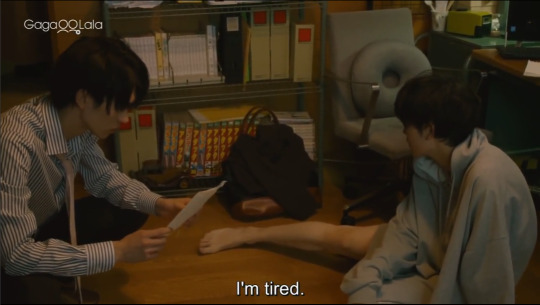
[Y: もう疲れた。あんたといると疲れる。嫌いだ S: お前 酒入るとめちゃくちゃしゃべるんだな Y: ねぇ、何で雨の時はだめなの? S: はあ? だって、お前が言ったんだろう] Y: (I'm) tired out. When (I'm) with you, (I) get tired. Hate it. [We've lost the "I" pronouns here, because the emphasis is on the extreme sense of physical and emotional fatigue as opposed to Yoh himself, and on how much he dislikes that feeling. Of note, "hate" here is closer to "detest/really dislike" - the word is "kirai" - which is not as strong as the word "nikui" which we talked about in Ep 1 when Yoh said he hated the part of him that always listened to Segasaki. Also, this is the first time Yoh has addressed Segasaki with the pronoun "you" out loud - he uses "あんた anta", which he also used in his head in Ep 1, after they did it. Again, we'll talk about this in the analysis post in the future, but for now just know that this term is usually used between older couples.] S: You... once you start drinking you really start talking huh? [literally, you "become able to talk"] Y: Hey...why is it when it rains, (we) can't do it? S: What? Because, you said so didn't you? [the last "haa?" from Segasaki! This time expressing his surprise and slight indignation.]
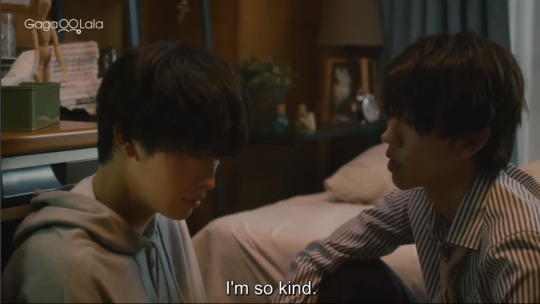
[S: 俺は優しいんだ] S: I. am. Kind. Great example of Segasaki's use of the "ore" pronoun here to quite literally emphasise how great he is. "優しい (kind)" in Japanese carries the connotation of being thoughtful, anticipating the other person's needs and wants and then meeting them etc. It's a characteristic that people often say they look for in their potential partners.
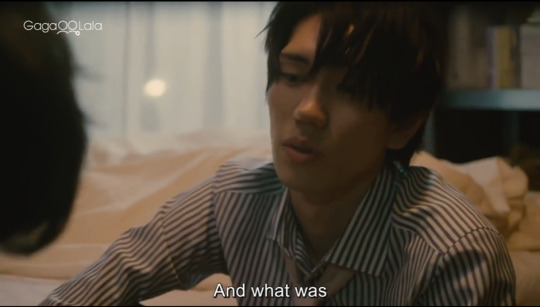
[S: そもそも、なんだ先の言いぐさは 好きじゃないだの 出ていきたいだの お前 俺のプロポーズを受けといてよくそんなことが言えんな S: 養ってやる*っつってんだ プロポーズ以外になに] S: In the first place, what was with those things you said earlier? That you don't like me, that you want to leave... You... that was rich, saying all that after accepting my proposal. S: I was saying I'd provide and care* for you. If that's not a proposal than what is? ["養ってやる" is a pretty possessive way to say I'll provide for you - it's the same word used when referring to parent providing for a child, or an owner providing for a small animal. It's not rude per se, but it does imply a power imbalance. Segasaki actually sort of has a point here because... this is not something you say to someone else unless you're in a relationship ^^;]

S: ていうかお前、俺のこと嫌いなんだ S: どうなの S: Actually about that... so you hate me huh? S: Which is it?
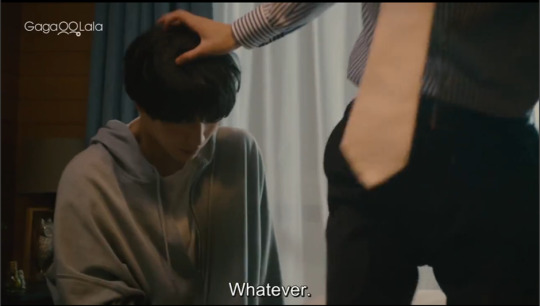
S: ふーん。あ、そ S: Ohh..? I see. ふーん (Ohh..?) - Segasaki says this a lot, especially in this episode. This is another one of those sounds that isn't a word but carries a lot of meaning. It has a dismissive sort of tone to it, like you've already assumed something or when you're pretty nonchalant/not impressed about whatever the other person has said and are just playing along with them by giving them some attention (so again, if you use it wrongly, it can piss people off). Segasaki uses it whenever Yoh goes mute or shy, as a way to tease Yoh - though Yoh seems to think Segasaki is dismissing/not interested in his answer. あ、そ (A, so) - again, Segasaki says this a lot - can be interpreted as "oh really?/I see/is that so?" - Combined with the above, you can see why Yoh often thinks Segasaki isn't interested in his answer, and even when he does recognise it as teasing, he gets too flustered to do anything about it.
This seems to have gotten longer, if you reached the end - congratulations! I hope this makes it a little clearer why it's so obvious to us as the viewer that Segasaki is really quite patient with Yoh, and is waiting for him to come to terms with his feelings, but at the same time so confusing for Yoh, because of the way many of these interactions can be read both ways. In Ep 3, we'll really be able to get into their dynamics because they've got so much more interaction together.
#my personal weatherman#taikan yohou#体感予報#MPW subtitle corrections#mytranslations#finally got it out#doing a breakdown of the argument was very fun#this is like the most indulgent t/n ever#i am indulging myself the same way segasaki indulges yoh#thanks to everyone for reading my indulgent notes#please geek out with me more#these two are so perfect for each other#sorry I wanted to get Ep 3 and the analysis out before Ep 4 but it's not happening
207 notes
·
View notes
Text
食材の多い料理店
The Restaurant of Many Ingredients (Much Meat)
全身白髪だらけだと
As he strokes his red crest,
赤いとさかを撫でながら
Fry Kitchen grumbles that he's covered
フライ・キッチンがぼやく
Head to toe in white hairs
石臼での粉挽きなど
This is the first time in his life
生まれて初めて 昔は
That he's ever ground flour with a stone mortar
そんな身分じゃなかった
This hadn't been his standing in life in the past
.
屍用人に身を落としても
Though he'd stooped to the position of undead servant
家畜の姿に変わっても
Though his form had changed to that of livestock
意外と気分は悪くない
It actually isn't all that bad
今になって気がついたのさ
It was now that he realized
机に積まれた札束など
That stacks of money piled up on a desk
何の意味も無かったんだと
Don't really mean anything
.
肉の焦げた匂いが漂う
The smell of charred meat wafts through the air
次は自分じゃない事を祈る
He prays that he isn't next
.
ずっとうんざりしてたのさ
He'd always been so bored and fed up
23人の兄弟ども
So he finally bid farewell
ようやく別れを告げて
To his 23 siblings
ポーク・チョップは独立した
Pork Chop had set out on his own
嬉しい事のはずなのに
This should have been a happy thing
何故だか少し寂しい
But somehow it was a little lonesome
.
鼻を鳴らして野菜を切る
He cuts vegetables while snuffling and snorting
刃物の扱いは慣れたものさ
He's gotten used to holding a knife
何人も刻んできたから
Since he's chopped up countless people
希代の始末屋だったのに
He'd once been uncommonly stingy
今じゃのろまの従兄弟にさえも
But nowadays he can't even hold a candle
頭があがりゃしないのさ
To those blockhead cousins of his
.
熊の瞳がこっちを見ている
The bear's eyes are looking his way
獲物が自分じゃない事を祈る
He prays that he's not its prey
.
憧れのあの方にならば
Chateau Briand had declared that
食べられても構いませんわ
As long as it was by the one he admired
シャトー・ブリアンは言い切った
He wouldn't mind being eaten
あの日話しかけられなくて
He hadn't been able to speak to them that day
助ける事が出来なかった
And so couldn't save them
後悔は今も残る
His regrets linger even now
.
16人目のコックにな��
He'd become the 16th cook
決意して門をたたいたけど
Though he had mustered his will and applied for an apprenticeship
既に屋敷はもぬけの殻
The mansion was already an empty husk
今ではもうあの時とは
And now everything
全てが変わってしまったけど
Is different from the way things were then
変わらないものだってあるの
Yet there are some things that haven't changed
.
けだるげな赤猫をみかける
He spies a listless looking red cat
自分のお腹の肉をなでる
It pats the meat of his belly
.
たどたどしい手つきの料理
I wordlessly gaze upon
行う弟子たちの姿を
The sight of my pupils
俺は無言で眺める
Carrying out their clumsy cooking technique
昔のことなど忘れた
I've forgotten most of my past
それでもこの調理場には
Even so, this kitchen
懐かしい匂いがする
Has a scent that brings back memories
.
誰かと旅をし料理をする
To go traveling with someone, and make food with them,
それがかつて自分が望んだ
Wasn't that the life that I had once
生活だったのだろうか
Wished to have?
店をにぎわす異界の客
These guests from the parallel world bustling through the restaurant,
彼らのために用意された
I reach for the new ingredient
新たな食材を手に取る
That I've prepared for them
.
幸せの花は赤く綺麗で
The flower of happiness is a lovely red
メインディッシュのスパイスに最適
It'll be a perfect spice for the main dish
.
再び弟子たちに目をやる
Again he looks towards his apprentices
選ばなければならない
He'll have to select
メインディッシュの食材を
The main ingredient for the main dish
不足で困る事は無い
He isn't lacking in choice
ここはとても食材の多い
This is Mister Dog's restaurant
ミスター・ドッグの料理店
Of many ingredients
30 notes
·
View notes
Text
Fun fact: The name of every main character in grand maison Tokyo contains the name of a type of food or seasoning.
尾花夏樹 (おばな なつき)
ばなな:banana
早見倫子(はやみ りんこ)
みりん: mirin
平古祥平(ひらこ しょうへい)
こしょう: pepper
芹田公一(せりた こういち)
せり: celery
たこ: octopus
蛯名美優(えびな みゆう)
えび: prawn
松井萌繪(まつい もえ)
いも: potato
峰岸剛志(みねぎし つよし)
ねぎ: scallion
柿谷光(かきたに ひかる)
かき: persimmon/oyster
丹後学(たんご まなぶ)
ご ま: sesame
リンダ・真理子・リシャール (りんだ・まちこ・りしゃーる)
ちこり: chicory
久住琹奈(くずみ かんな)
みかん: orange
江藤不三男(えとう ふみお)
とうふ: tofu
相沢瓶人(あいざわ かめひと)
わかめ: seaweed
京野陸太郎(きょうの りくたろう)
のり: another type of seaweed, dried and edible, often used for wrapping sushi
Some of these are quite obvious like 芹田, 蛯名, and 柿谷 which already have food-related kanjis in them. And some of them are kinda reflective of these characters’ personalities. Banana in natsuki’s name is so cute, yellow one the outside and white on the inside. Mirin, the quintessential Japanese seasoning is symbolic of rinko’s cooking style, incorporating traditional Japanese ingredients into French cuisine. It’s no coincidence that both names of aizawa and kyono, who used to work with obana back in Paris, contain a type of seaweed. The versatility of wakame is representative of aizawa’s talent for paring ingredients. Nori, on the other hand, is very dry like kyono, difficult to eat it alone. Kyono is like nori in that he always needs partners.
#takuya kimura#木村拓哉#La grande maison Tokyo#グランメゾン東京#kyoka suzuki#鈴木京香#it just makes me wondering if the screenwriter came up with the food names first and then characters names or the other way around#editing this post was very exhausting as I had to switch between keyboards and I had around a dozen of keyboards on my phone😵
35 notes
·
View notes
Text



みんな、こんにちは!
今日は何をしましたか?友達とレストランで美味しいブランチを食べて、タピ活をしました。
オムレットの中でハムとソーセージとキノコとタマネギとチーズがありました。すごく美味しかったです!肉は美味しいですが、野菜も食べるのが大切でしょう?
いちごミルク味とタロ味が好きですが、今回イチゴのを選りました。とてもおいしかったです!
今週の晩ご飯は生姜焼きです!生姜のソースを作るは簡単です。ソースの材料は:
醤油 (しょうゆ) - soy sauce
味醂 (みりん) - mirin
砂糖 (さとう) - sugar
料理酒 (りょうりしゅ) - cooking sake
おろしたて生姜と玉ねぎ- freshly grated (おろしたて) ginger (しょうが) and onion (たまねぎ)
最近、私の勉強は快調です。ようやく漢字を思い出して、書くもができます!嬉しいです!(*^▽^*)
先週の漢字:
草 (grass) 🌱 - Grass/plant radical + early/fast = Grass is the fastest growing plant.
林 (grove)🌲 - Tree + tree = Two trees make up a grove.
森 (forest) 🌳🌳 - Tree + tree + tree = Three trees make up a forest.
交 (mix, mingle) 🥣 - Pot lid radical + Father = The Pot Lid Dad Society (dads wearing pot lid hats) have a mixer every 6 (六) months.
校 (school) 🏫 - Tree + Mingle = The Pot Lid Dad Society has their mixers/meetings outside the school.
言 (word) ✏️ - Lines + Mouth = You use your mouth to say lines of words.
語 (language) ✍️ - Word + 5 + Mouth = Language is produced by many mouths.
話 (story, to talk) 🗣️ - Word + Tongue (or Thousand + Mouth) = A story is passed down from one person to the next until a thousand mouths can repeat it.
売 (to sell) 🎁 - Samurai + Hat + Human Legs = A jobless samurai walks door-to-door to sell hats.
読 (to read) 📖 - Word + Sell = Extra, extra! Read all about it! (The newspaper "sells words.")
本 (book, origin) 📕 - A book is the root/origin of knowledge, made from trees (木).
#japanese#japanese language#langblr#japaneseblr#japanese langblr#jpnlangblrnet#日本語#勉強#日記#ダイアリー#料理#食べ物
17 notes
·
View notes
Text
youtube
今日のおやつに、濃厚チョコレートレアチーズケーキ的なものを作りました。しかも材料たった2つ!っていうか高級レストランで、もっとお洒落にしてだされても、納得するくらいのレベルの味の美味しさでびっくり。。。😳
動画にしたので、興味のある方是非作ってみて下さいね!🍮
Made this 2 ingredient chocolate mouse today! Was super rich, smooth, velvety and chocolatey!! I probably wouldn’t notice if I had this at a high end restaurant… was shockingly delicious!!
Watch the video and give it a try! 🍮
💕Check out my youtube channel for more easy and delicious recipes!! Enjoy!! 💕
#chocolate#dessert#recipe#YouTube#cooking#yogurt#easy recipe#チョコレート#おいしい#food#ヨーグルト#デザート#スイーツ#レシピ動画#レシピ
115 notes
·
View notes
Text



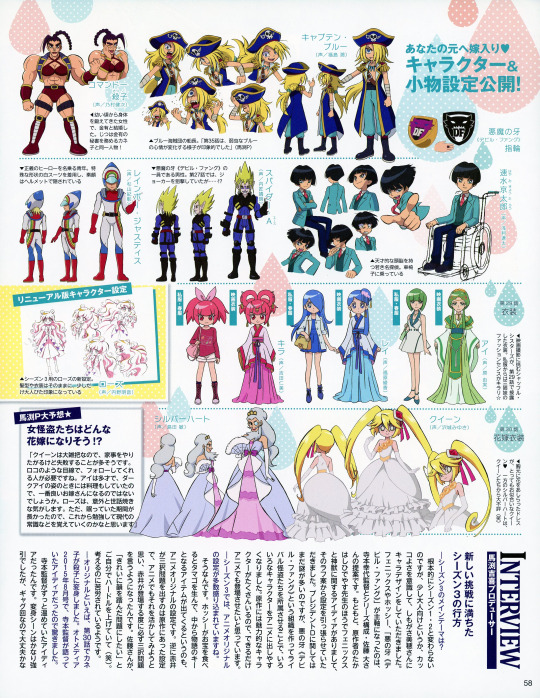
Otomedia June 2016
(Below is a cleaned up machine translation. Please note that due to the nature of machine translation, the text may not be wholly accurate or may read oddly. Japanese is included after English for reference. The text was lifted from the images using this site, and though there's been care taken to make sure everything is correct, there is a chance of unintentional typos.)
With the Only one prince + superb honeymoon in paradise♡
Only oneの王子様と+楽園で極上ハネムーン♡
▼ Spade offers a handkerchief to Joker, who is soaking wet from the rain. Phoenix is in a panic because of the rain, which he doesn't like!
▼雨でびしょ濡れになっ��ジョーカーに、ハンカチを差し出すスペード。フェニックスは、苦手な雨に大慌て!
Joker dressed up as a woman to participate in the World Bride Grand Prix. The exotic dress suits him ♪
世界花嫁グランプリ出場のため、ジョーカーが女装した姿。 エキゾチックなドレスがお似合い ♪
--Producer Mabuchi Yoshiki Interview
Joker and new characters such as Phoenix (Akai Tsubasa) and members of the "Devil Fang" organization led by President D continue their unpredictable adventures in "Kaitou Joker" Season 3. I'm sure your hearts are racing with excitement, but how about another thing that makes your heart flutter♥
This time, we have a fantasy of newlywed life with Joker and friends ♪ We also have special cooking tips for the future brides. Of course, the excitement will be even more intense in the full-length anime! We received the following secret information from producer Yoshiki Mabuchi of Shin-Ei Animation! The main highlights are Phoenix and Hosshi. Their mysteries will be gradually revealed during the 16 episodes between Season 3 and the upcoming Season 4. In Season 1 and Season 2, the story was rather complete, but in Season 3 and Season 4, the mystery will be solved by watching all the episodes. Also, the tricks this time were supervised by a real magician, RYOTA, who came up with the ideas for the tricks.
Let's explore the charms of Season 3 from various angles, such as the concepts of new characters and the event report manga, with Producer Mabuchi still with us. ♪
赤井翼ことフェニックスやプレジデントD率いる組織「悪の牙 《デビル・フ ァング》」のメンバーなど、ジョーカーと新キャラクターたちの予測不可能な大冒険が続く『怪盗ジョーカー』シーズン3。ドキワクの連続にみなさまの心は高鳴りまくっていることと思いますが、ここで一つ、胸キュンなトキメキもいかがでしょうか♥
ということで、今回はジョーカーたちとの新婚生活をたっぷり妄想♪未来の花嫁のために、ジョーカーたちから料理にまつわる特別コメントも入手しました。もちろん、アニメ本編でもドキドキはさらに加速!シンエイ動 画の馬渕吉喜プロデューサーからは、こんなマル秘情報をGETいたしました!!! 「要注目はフェニックスとホッシーです。 シーズン3の全16話と次のシーズン4 にかけて、彼らの謎が徐々に明かされます。シーズン1・2ではわりと1話完結に近い形で物語が進んでいきましたが、 シーズン3・4では全編を通して観ることで謎が解かれる仕掛けになっています。 また、今回はトリックもリアルマジシャンのRYOTAさんに監修していただき、 アイディアを出していただいています」
馬渕Pにまだまだお付き合いいただき、 新キャラクターの設定やイベントレポートマンガなど、さまざまな角度からシーズン3の魅力を探っていきましょう♪
--Character Question
Do you prefer to cook or to eat food cooked for you? 料理は作るのが 好きですか食べるのが好きですか?
Joker: "Of course I prefer to eat, Hachi makes the best curry~! My specialty is cup ramen! I'll treat you to some another time, okay?"
ジョーカー : 「もちろん食べる方が好きだな!ハチが作るカレーは最高なんだぜ~!得意料理はカップラーメンだな! 今度ごちそうしてやるぜ?」
Tsubasa: "Hm, I've never cooked before… Well, here's the question: if I were to cook, what would it be? 1. Super spicy curry, 2. Super spicy mapo tofu, 3. Konpeito Southern Cross style (very spicy). By the way, I like very spicy food."
翼「料理は作ったことがないな〜。 さて、問題。 僕 が作るとしたら何料理でしょう? 1激辛カレー、 2 激辛マーボー豆腐、 3金平糖サザンクロス風 (激辛)。 ちなみに僕は激辛料理が好物だよ」
Spade: "I guess it's hard to decide between cooking and eating. Dark Eye makes delicious food, so I leave it up to him, but when I'm stuck in a writing dilemma, sometimes I just make French food."
スペード: 「作るか食べる かの優劣はつけがたいか な。ダークアイが美味しいご飯を作ってくれるから任 せきりだけど、執筆に煮詰 まった時はひたすらフランス料理を作ることがあるよ」
--Mabuchi P (Producer Mabuchi Yoshiki) prediction
Mabuchi P big prediction★ What if you let the phantom thieves do your housework!?
馬渕P大予想★ 怪盗たちに家事を任せるなら!?
Joker "Likely has the ability to select good things, so it could be shopping."
ジョーカー 「良い物を選別する力 があると思うので、 ショッピングでしょうか」
Hachi "All the housework. He's the ideal wife that everyone wants (laughs)"
ハチ 「家事すべて。 もはや 誰もが欲しがる、 理想の嫁ですね (笑)」
Phoenix "He's sleeping all the time, so I feel like he's going to be a lazy house-husband (laughs)"
フェニックス 「ずっと寝ているので、 ダラダラした主夫になりそうです (笑)」
Shadow "He seems to take good care of people, so I guess it would be picking up the kids and taking out the trash."
シャドウ 「面倒見は良さそうなので、子どものお迎えやゴミ出しでしょうか」
Spade "He's also a novelist, so perhaps he might not do well with housework."
スペード 「小説家もやっている ので、家事向きではないかもしれないですね」
--Mini Talk
Reverse Proposal Tips! Phantom Thief Mini Talk ♪ What gift makes you happiest?
逆プロポーズのヒント!? 怪盗ミニトーク♪ プレゼントされて一番嬉しいものは?
Joker & Tsubasa: "A game!!" Spade: "You guys are so in-tune…" Joker: "No way! Okay, if you like games, let's play an action game!" Tsubasa: "That sounds fun!" Spade: "I'll pass. You really do like that sort of thing, you're like children." Tsubasa: "You just don't like losing, do you?" Joker: "Yeah, right!" Spade: "That isn't the case! Fine then, let's do it!" Wings: "By the way, what's an action game?" Joker & Spade: "Eh……"
ジョーカー&翼 : 「ゲーム!!」 スペード: 「キミたち気が合うね……」 ジョーカー : 「あわねーよ! よぉし、ゲームが好きだって言うなら、アクションゲームで勝負し 「ようぜ!」 翼: 「おもしろそうじゃないか」 スペード: 「僕はパス。 本当に好きだね、 子どもみたいだよ」 翼: 「そんなこと言って、負けるのがイヤなだけなんじゃないのかい?」 ジョーカー : 「そーだそーだ!」 スペード: 「そんなことあるわけないだろ! やってやろうじゃないか!」 翼: 「で、 アクションゲームってなんだい?」 ジョーカー & スペード: 「え・・・・・」
--Pg 58-59
Mabuchi P's Big Prediction ★ What kind of brides will the female phantom thieves be!? "Queen is rough around the edges and wants to do the housework but often fails. She will need someone like Roko to follow her through. Ai is versatile, and she also cooks when in her Dark Eye form, so I think she will make the best bride. Rose seems surprisingly caring; However, she has been asleep for a long time, so I think she will be studying and learning modern common sense."
馬渕P大予想★ 女怪盗たちはどんな花嫁になりそう!? 「クイーンは大雑把なので、家事をやり たがるけど失敗することが多そうです。 ロコのような目線で、フォローしてくれる人が必要ですね。 アイは多才で、 ダークアイの姿のときには料理もしていたので、一番良いお嫁さんになるのではないでしょうか。ローズは、 意外と世話焼き な気がします。 ただ、 眠っていた期間が 長かったので、 これから勉強して現代の 常識などを覚えていくのかなと思います」
--INTERVIEW Producer Yoshiki Mabuchi
What is the main theme of Season 3?
The characters are fundamentally the same as in Seasons 1 and 2, but we asked Miho Shimogasa to design them with a slightly more adult or "cool" look in mind. Phoenix, Hosshi, and "Devil Fang" became the main characters at the suggestion of director Yukiyo Teramoto and series director Dai Sato. Originally, the original author, Hideyasu Takahashi, had an idea for the Phoenix and the Divine Beast, and we pulled the concepts from a rough draft of that idea. There are still many mysteries about President D, but by creating an organization called "Devil Fang" and having rival thieves belong to it, it became easier to bring out various characters in the anime. There are many fascinating characters in the original story, and we want to include them in the anime as much as possible.
In Season 3, you seem to have included a number of concepts that are original to the anime.
Yes, that's right. The concept of Hosshi eating treasures and laying eggs, where key items of the story come out of, is also an original concept of the anime. On the other hand, Akai's three-choice questions are a concept that existed in the original story, and we decided to make use of it in the anime as well, so Akai always says the three-choice question every time he appears in the story. Mr. Sato raised the bar himself, saying, "I want the questions to rhyme nicely" (laughs). He had a hard time thinking about it.
Speaking of originality, Kaneko transformed into a murderous woman in episode 30. I was surprised because this was an idea that Director Teramoto had mentioned in the August 2015 issue of Otomedia.
It was an idea that Director Teramoto had been working on for a long time. The transformation scene was quite forced, but since it was a gag episode, I thought it would be okay (laughs). The next episode, episode 31, "Shadow and Eyes and Fakes" was also a gag episode, and everyone on the staff wanted to do it. Shadow also made an appearance for the first time in a while, and he too became more of a gag (laugh). We also introduced Fake Silver Heart and fake Roko, who were not in the original work. Fake-Silver is a robot and Fake-Roko is a skunk. In the original, Fake-Queen is the character who farts, but in the anime, we switched that concept to Fake-Roko. The cast is also spectacular, with Kenichi Suzumura as fake Joker, Toshiyuki Toyonaga as fake Spade, and Kaori Nazuka as fake Queen. The casting was done after asking Ayumu Murase, who plays Joker, who he would like to play a fake version of his character.
The opening and ending sequences were just as impressive as the previous and the OP was storyboarded by Takashi Otsuka, who also directed the previous season's OP, to match Arukara's "Miracle Shounen Boy 2" with an emphasis on coolness. Tasuke Inamura, the vocalist of Arukara, came up with the idea for the intro of the song, which includes the call "Hachi!" The ED is innovative, with Joker in red and the Hachi in blue, each running on a road in their image color. The ED is sung by Fuki Commune and fits perfectly with the song "Welcome to the Shining Night!"
What are the upcoming episodes and characters?
There are stories featuring DJ Peacock and Ali Baba. Stay tuned for a rendition of "Ali Baba and the Four Detectives." The story of Rainbow Justice will also involve the Devil Fang. In addition, watch for the original anime episode "The Sky Joker in Peril"! The story and tricks are completely original, and it takes place on Joker's airship, the Sky Joker. You will also see Joker's treasure room and learn about the inside of the ship.
INTERVIEW 馬渕吉喜プロデューサー
シーズン3のメインテーマは?
根本的にシーズン1・2と変わらない のですが、少し大人向けというか、カッ コよさを意識して、しもがさ美穂さんにキャラデザインをしていただきました。 フェニックスやホッシー、「悪の牙 《デ ビル・ファング》」が主軸になったのは、 寺本幸代監督とシリーズ構成・佐藤大さんの提案です。 もともと、原作者のたかはしひでやす先生のほうでフェニックスと神獣に関するアイディアがありまして、 そのラフ案から設定を引っ張らせていただきました。 プレジデントDに関してはまだ謎が多いのですが、悪の牙 《デビ ル・ファング》という組織を作ってライバル怪盗たちを所属させることで、いろいろなキャラクターをアニメに出しやすくなりました。原作には魅力的なキャラクターがたくさんいるので、できるだけアニメでも登場させたいと思っています。
シーズン3では、アニメオリジナルの設定が多数盛り込まれていますね。
そうなんです。 ホッシーがお宝を食べるとタマゴを生んで、中から物語のキーとなるアイテムが出てくるというのも、 アニメオリジナルの設定です。 逆に赤井が三択問題を出すのは原作にあった設定で、アニメでもそれを活かしてみようと思い、赤井が登場する度に必ず三択問題を言うようになったんです。佐藤さんが、 「きれいに韻を踏んだ問題にしたい」とご自分でハードルを上げていて(笑)。 考えるのに苦労されているようです。
オリジナルといえば、第30話でカネ子が殺子に変身しました。オトメディア2015年8月号で、寺本監督が語っていたアイディアだったので驚きました。
寺本監督がずっと温めていたアイディアだったんです。 変身シーンはかなり強引でしたが、ギャグ回なので大丈夫かなと(笑)。続く第31話 「影と瞳と偽物と」 もギャグ回で、スタッフみんながやりたがっていたエピソードでした。シャドウも久しぶりに登場して、彼もだいぶギャグ色が強くなってきましたね(笑)。原作にはいない、二セシルバーハートや二セロコも登場させました。 ニセシルバーはロボットで、ニセロコはスカンクですね。原作だとニセクイーンがオナラをするキャラクターなのですが、アニメでは その設定をニセロコに持っていきました。 キャストも豪華で、ニセジョーカーを鈴村健一さん、二セスペードを豊永利行さ ん、ニセクイーンを名塚佳織さんが担当しています。これはジョーカー役の村瀬歩さんたちに「ご自身の担当キャラの偽物をやってもらうなら誰がいいか」と希 望を聞いて、キャスティングした形です。
本編と同じく、オープニングとエンディングの映像もとても印象的でした。OPはアルカラの「怪盗ミラクル少年ボーイ2」にあわせ、前シーズンでもOPを担当していただいた大塚隆史さんに、 カッコよさを全面にだして絵コンテ演出をしていただきました。 アルカラのボーカルの稲村太佑さんのアイディアで、 イントロに「ハチ!」という掛け声が入っているんですが、そのタイミングでハチが画面に登場していますよ。EDは斬新でジョーカーなら赤、ハチは青と、各イメージカラーの道の上を走る構成です。 Fuki Communeさんが歌う「輝く夜へようこそ!」ともピッタリ合っていますよね。
―今後の注目エピソード&キャラは?
DJ・ピーコックがメインのお話や、 アリババが登場するエピソードがあります。 「アリババの4人の探偵団」の描写は、ぜひご期待ください。 レインボー・ジャスティスのお話には、悪の牙 《デビ ル・ファング》も絡んできますよ。 そして、アニメオリジナルエピソード「スカ イジョーカー危機一髪」にも注目です! ストーリーもトリックも完全オリジナルで、ジョーカーの飛行船「スカイ・ジョーカー」が舞台になってます。 ジョーカーのお宝部屋なども出てきて、スカイ・ジョーカーの内部が分かりますよ。
70 notes
·
View notes
Text
Memo for Episode 11 (Ep.35) “The Hunt”
馬閃(バセン)「茘(リー)、という国名(こくめい)は、その一文字(ひともじ)で、建国(けんこく)の物語(ものがたり)を表(あらわ)している。草(くさ)の下(した)に三(みっ)つの刀(かたな)…。草は華(はな)、帝(みかど)の先祖(せんぞ)である王母(おうぼ)を指(さ)し、その下の三つの刀は王母を助(たす)けた三人(さんにん)の武人(ぶじん)を示(しめ)す。三つの刀のうち、下二(ふた)つに比(くら)べて大(おお)きい刀は、北(きた)の大地(だいち)・子北州(しほくしゅう)を指(さ)す。子北洲一帯(いったい)は、高粱(コーリャン)や麦(むぎ)を栽培(さいばい)していて、さらに北に行(い)くと、山岳地帯(さんがくちたい)が広(ひろ)がり…て、聞(き)いてるのか!?」
Basen “Rī, to-iu koku-mei’wa, sono hito-moji’de, kenkoku’no monogatari’o arawashite-iru. Kusa’no shita’ni mittsu’no katana… Kusa’wa hana, mikado’no senzo-de-aru Obo’o sashi, sono shita’no mittsu’no katana’wa Obo’o tasuketa san-nin’no bujin’o shimesu. Mittsu’no katana’no-uchi, shita futatsu’ni kurabete ookii katana’wa, kita’no daichi, Shi-Hoku-shu’o sasu. Shi-hoku-shu-ittai’wa, kōryan’ya mugi’o saibai-shite-ite, sarani kita’ni ikuto, sangaku-chitai’ga hirogari…te, kiiteru-noka?!”
Basen “The character used to write the name of our nation, ‘Li,’ also depicts the story of its founding. Three swords under grass. ‘Grass’ is for ‘flower,’ representing the Mother Royal, ancestor of the emperor. The three ‘swords’ under it represent the three warriors who helped her. Of the three swords, the one larger sword represents the Shihoku-shu, the northern lands. That entire area grows sorghum and wheat. If you go further north, you enter a mountainous region… Hey, are you listening?!”
In this line, Basen explained the Kanji “茘(リー)” in detail. For your better understanding, please see below.

――――――――――――――――――――――――――――――
馬閃「何でこんな娘を父上(ちちうえ)は…」
Basen “Nande konna musume’o chichi-ue’wa…”
Basen “Why does my father care so much about this girl?”
The fact that he said this to her shows how young and immature he is, although she is also at fault for dozing off while listening to his explanation.
――――――――――――――――――――――――――――――
猫猫(はて?)「何(なに)か、変(か)わった趣向(しゅこう)でも?」
Maomao (Hate?) “Nanika, kawatta shuko’demo?”
Maomao (Huh?) “Is this some kind of strange rule?”
趣向(しゅこう/Shuko): There seems to be no word which directly refer to it in English… Idea, plan, or taste is used depending on the context.
趣味・趣向(しゅみ・しゅこう) is sometime used in Japanese. 趣味(Shumi) is “hobby”. For example, let’s say I have a hobby of Karaoke and I have a karaoke party with my friends once a month. And I say 「来月は趣向を変えて、コスプレでアニメソングのカラオケパーティをしよう!」. It means “Next month, let’s do something different and have a cosplay karaoke party singing anime songs!” In this case, 趣味(Shumi) is “hobby: karaoke”, and 趣向(Shuko) is “how we enjoy karaoke: cosplay and sing anime songs”. So I guess I can say 趣向(Shuko) is an idea to enjoy something based on your taste.
The word is also used in the following line later;
猫猫(狩りは、宿(やど)から30分(さんじゅっぷん)馬(うま)に揺(ゆ)られ、徒歩(とほ)で一時間(いちじかん)山(やま)を登(のぼ)った高台(たかだい)で行(おこな)われる。お偉方(えらがた)が捕(つか)まえた獲物(えもの)をその場(ば)で調理(ちょうり)するという趣向(しゅこう)のようだ)
Maomao (Kari’wa, yado’kara sanjuppun uma’ni yurare, toho’de ichi-jikan yama’o nobotta taka-dai’de okonawareru. Oera-gata’ga tsukamaeta emono’o sono-ba’de chori-suru-to-iu shuko’no-yoda.)
Maomao (The hunt takes place at a location half an hour away by horse, and then one hour up the mountain by foot. It seems like the point of the event is to cook the game caught by the nobles on the spot.)
――――――――――――――――――――――――――――――
猫猫「そうですか…」(やっぱり壬氏様はいいとこの出(で)なのか…うん、うん)
Maomao “So-desuka…” (Yappari Jinshi-sama’wa ii-toko’no de nanoka… Un, un.)
Maomao “I see.” (So Master Jinshi is from a good family, after all.)
いいとこ(ii toko): good family, good place = いい所(ところ/tokoro)
The word is also used in the following line later;
李白「こんにちは?あ~!嬢(じょう)ちゃんか!どうしたんだ?こんなとこで」
Rihaku “Kon’nichiwa? Aaa! Jochan-ka! Do-shitanda? Konna toko’de.”
Lihaku “Hello? Hey! Little miss! What are you doing all the way out here?”
――――――――――――――――――――――――――――――
高順「小猫は例(れい)のことを何一(なにひと)つ知(し)らない」
Gaoshun “Shaomao’wa rei’no koto’o nani-hitotsu shira-nai.”
Gaoshun “Xiaomao knows nothing about it.”
例の(れいの/Rei’no): the, that, it
This word is used in situations where the speaker and listener know what it refers to, or when they feel embarrassed to say it directly. It enables you to speak without a third party being able to understand.
The word is also used again in the following line later;
男1「これが例(れい)の…随分(ずいぶん)小型(こがた)だな」
Otoko-Ichi “Korega rei’no… zuibun kogata dana.”
Man-1 “Is this it? It’s quite small.”
――――――――――――――――――――――――――――――
猫猫「はぁ。もともと壬氏様のお食事(しょくじ)です」
Maomao “Haa. Moto-moto Jinshi-sama’no oshokuji desu.”
Maomao “Well, it’s your food, after all.”
はぁ(Haa): casual and broken way of saying “はい: Yes”. It shows that Maomao is questioning why he asks such a question. Otherwise “はぁ” may be considered a rude response.
もともと(Moto-moto): originally
壬氏「本当にいいのか?!」
Jinshi “Honto’ni ii-noka?!”
Jinshi “Are you absolutely sure?”
Maomao has no idea why he’s asking so emotionally, but you all do, maybe. His condition is already not good at this point, and he seems to be unable to control his emotions.
――――――――――――――――――――――――――――――
壬氏「ああ。むしろ食え」
Jinshi “Aa. Mushiro kue.”
Jinshi “Yeah. In fact, I order you to.”
むしろ(Mushiro): rather
むしろ+命令形(めいれいけい/Meirei-kei: instruction form): Or rather, do it.
――――――――――――――――――――――――――――――
猫猫「なぜと言われましても…そういう体質(たいしつ)ですから」
Maomao “Naze-to iware-mashitemo… So-iu taishitsu desu-kara.”
Maomao “All I can say is that’s just how I’m built.”
体質(たいしつ/Tai-shitsu): constitution, physical makeup
――――――――――――――――――――――――――――――
猫猫(お若(わか)いとは大変(たいへん)である)
Maomao (Owakai-towa taihen’de aru.)
Maomao (It’s not easy being young and vigorous.)
If I translate it directly, it will be “It is tough to be young.” But Maomao’s way of saying is suggestive, such as “お若い” instead of “若い” even though it’s not necessary to add “お”(Keigo, honorific) for Basen in her monologue. And also judging from the context, we can understand that “…and vigorous” is hidden in her line.
――――――――――――――――――――――――――――――
猫猫(湯(ゆ)あみまでできるとは…贅沢(ぜいたく)だなぁ…。明日(あした)は狩りか…。つつがなく終(お)わるといいけど)
Maomao (Yuami-made dekiru-towa…zeitaku-danaa… Ashita’wa kari-ka… Tsutsuga-naku owaru-to ii-kedo.)
Maomao (A bath, too? How extravagant. The hunt starts tomorrow. I hope it goes without incident.)
つつがなく(Tsutsuga-naku): formal word which means safely, well, without any incident/trouble.
――――――――――――――――――――――――――――――
男1「ここで、あの方には死んでもらう」
Otoko-Ichi “Koko’de, ano kata’niwa shinde-morau.”
Man-1 “This will be where they die.”
方(かた/Kata): It’s like a Keigo of “人(ひと/Hito): person”, same as “お方(おかた/Okata)”. With “お” or without, it means honorific feeling to the person. And if it means more than two people, 方 becomes “方々(かたがた/Kata-gata)”, so this 方 only refers to the single person: Jinshi. I wonder why they translated it as “they”, which could lead viewers to mistakenly believe that Maomao was also a target. If I were to translate it, I would use “that gentleman.”
死んでもらう(しんでもらう): It's hard to translate this expression into English. ~してもらう means “have someone do” and maybe “Here, (is the place where) that gentleman shall die (for us).” would be my direct translation. In Japanese, such expressions are often used, especially in movies or games, just before someone is going to kill the other person, as a softer way of saying.
This line can be more polite, if you change もらう to いただく: ここで、あの方には死んでいただく.
――――――――――――――――――――――――――――――
猫猫「ちょっとご指名(しめい)があったもので」
Maomao “Chotto goshimei’ga atta-mono’de.”
Maomao “I was asked to join.”
指名する(しめいする/Shimei-suru): ask for a certain person, appoint, designate
――――――――――――――――――――――――――――――
猫猫(李白様も指名を受(う)けたのはいいが、地方出身(ちほうしゅっしん)の身(み)。他(ほか)の気位(きぐらい)の高い護衛たちに、追(お)い出(だ)された口(くち)だろう。最近(さいきん)どんどん出世(しゅっせ)しているようだが、その分風当たりは強(つよ)くなる)
Maomao (Rihaku-sama’mo shimei’o uketa-nowa iiga, chiho-shusshin’no-mi. Hoka’no kigurai’no takai goei-tachi’ni, oidasareta kuchi daro. Saikin don-don shusse-shite-iru-yodaga, sono-bun kaze-atari’wa tsuyoku-naru.)
Maomao (Master Lihaku got invited to join too, but he’s from the countryside. The other prideful guards must have pushed him out. He seems to be climbing the ranks recently, but that does tend to be met with resistance.)
~口(くち)だ(~kuchi da): be one of those who~
気位の高い(きぐらいのたかい/Kigurai’no takai): have lots of pride, prideful
風当たりが強い(かぜあたりがつよい/Kaze-atari’ga tsuyoi): windy, windswept, receive harsh treatment, greatly criticized
――――――――――――――――――――――――――――――
猫猫(避暑地(ひしょち)とはいえ、今日(きょう)は天気(てんき)も良(よ)く暑苦(あつくる)しい。快適(かいてき)に過(す)ごすのも一苦労(ひとくろう)だな…。…こんな暑苦しいのに、ずっと覆面(ふくめん)をつけて…料理(りょうり)にも手(て)を付(つ)けないつもりか?どんなに怪(あや)しい覆面姿(ふくめんすがた)でも、上座(かみざ)に座(すわ)っていれば、この中で一番(いちばん)の上客(じょうきゃく)ということなのだろう)
上座(かみざ/Kami-za): the top seat of honor, upper seat ⇔ 下座(しもざ/Shimo-za): the bottom seat, lower seat
I don’t know how it is in China, but in Japan, there are usually 上座 and 下座 in each room, and the guests are guided to 上座. Normally, 上座 is located at the farthest from the door/entrance, and 下座 is at the closest. It depends on each room, and even if it’s not the farthest from the entrance, the seat near the 床の間(とこのま/tokonoma) alcove or one with a good view may be the 上座.
――――――――――――――――――――――――――――――
猫猫(あれが楼蘭妃(ロウランひ)の父(ちち)、子昌様。子北洲の長(おさ)で、この狩りの主催者(しゅさいしゃ)だ。…ん?何か言われたのか?…いや、あのやたら外面(そとづら)のいい宦官が、あんなあからさまな態度(たいど)を取(と)るだろうか…。もしかすると、この暑さのせいで…)
Maomao (Are’ga Roran-hi’no chichi, Shisho-sama. Shi-Hoku-shu’no osa’de, kono kari’no shusai-sha-da. …N? Nanika iwareta-noka? …Iya, ano yatara soto-zura’no ii kangan’ga, anna akarasama-na taido’o toru-daroka… Moshika-suruto, kono atsusa’no sei’de…)
Maomao (That’s Master Shishou, Concubine Loulan’s father. He is the leader of the Shihoku-shu region and the organizer of this hunt. Hmm? Did he say something to him? Would that infinitely well-mannered eunuch show such an obvious attitude? Wait, could it be, because of the heat…)
���面のいい(そとづらのいい/Soto-zura’no ii): looks nice outside (but…)
It’s usually used in a negative sense, like “彼は誰にでも外面はいいが、家族には横柄だ(かれは、だれにでもそとづらはいいが、かぞくにはおうへいだ : He looks so nice with everybody outside, but he’s arrogant towards his family.”
あからさまな(Akara-sama-na): obvious, bald, bare, blatant
It’s also usually used in a negative sense, like “彼女はあからさまに私に意地悪だ(かのじょは、あからさまにわたしにいじわるだ/Kanojo’wa akara-sama-ni watashi’ni iji-waru da : She’s obviously mean to me.”
――――――――――――――――――――――――――――――
壬氏「自分でやる!お前のも貸(か)せ。俺の方(ほう)が力(ちから)があるだろう」
Jinshi “Jibun’de yaru! Omae’nomo kase. Ore’no-hoga chikara’ga aru-daro.”
Jinshi “I’ll do it myself. Give me yours, too. I’m stronger than you.”
猫猫「はあ」
Maomao “Haa.”
Maomao “Yes.”
Here is はあ instead of はい again, which shows Maomao is wondering why his mood seems worse. I think they just translated it as “yes”, because replacing by “yeah” or something would sound too rude.
猫猫(良かった…さっきより体調(たいちょう)は良さそうだ。機嫌(きげん)は悪(わる)そうだけど)
Maomao (Yokatta… Sakki-yori taicho’wa yosa-soda. Kigen’wa waru-soda-kedo.)
Maomao (Good, he looks healthier than earlier. His mood seems worse, though.)
It’s interesting that Maomao has no idea about his behavior, in spite that he’s just embarrassed.
――――――――――――――――――――――――――――――
猫猫「粗末(そまつ)な物(もの)で申(もう)し訳(わけ)ありませんが、食(しょく)していただけますか」
Maomao “Somatsu-na mono’de moshi-wake ari-masen-ga, shoku-shite-itadake-masu-ka.”
Maomao “I know it isn’t much, but would you like to eat any of this?”
粗末な物(そまつなもの/Somatsu-na mono): something shabby/poor/simple
That is a standard phrase to humble, which is used when giving a present in Japan, but in this case Maomao is saying that because butterbur is just a vegetable and it’s not something gorgeous.
~していただけますか(~shite-itadake-masuka): Would you mind if~? Could you~, please? Would it be possible to~?
Although they translated it into “would you like~,” I feel something is off a bit. I think “I’m afraid it’s just something simple, but could you please eat this, please?” is better, because she is not asking him if he’ll eat it, and actually, she’s asking him to eat it.
――――――――――――――――――――――――――――――
I’m sure you all thought “Don’t end here!” The incident where he jumped into the waterfall wasn’t in the original web novel, so when I read this in the light novel first, I was so surprised and thought “What? What’s going on?!” I’m really looking forward to the next episode, but I’m also a little worried, because some online and YouTube posts have overemphasized the sexiness of the scene. (Sorry, it might be the opposite of what you expect!) Anyway, let’s enjoy the next episode together!
#apothecary english#apothecary romaji#the apothecary diaries#apothecary diaries#learning japanese#japanese#薬屋のひとりごと#薬屋のひとりごと 英語#薬屋 英語 学習#japan#KNH#season 2
8 notes
·
View notes
Text
Members of society in Japanese
A simple bilingual vocabulary list for words related to society.
Lista słówek: członkowie społeczeństwa w języku japońskim
赤ちゃん (あかちゃん) = baby; infant; niemowle; dziecko
お腹がすいたら、赤ちゃんは泣く。 When babies are hungry, they cry. Kiedy dzieci są głodne, to płaczą.
男 (おとこ) = man; mężczyzna
女 (おんな) = woman; kobieta
男 and 女 are casual forms 男の人 and 女の人 are formal/regular forms 男性 and 女性 are more formal and 'adult-like'
仕事好きな女の人もいるし、料理や洗濯が好きな男の人もいる。There are women who like working, and there are men who like cooking and doing the laundry. Są kobiety, które lubią pracować i są mężczyźni, którzy lubią gotować i prać.
王(おう) = king; król
王様(おうさま) (sonkeigo; honorifics)
彼らは王の殺害をたくらんでいる They are plotting to kill the king. Knują spisek, by zabić króla.
企む (たくらむ) = to plan; to scheme; to plot; knuć
殺害 (さつがい) = [noun] killing; murder; morderstwo
女王 (じょおう) = queen; królowa
王妃(おうひ) = empress; wife of a king; cesarzowa; żona króla
エリザベス女王2世 Queen Elizabeth II Królowa Elżbieta II
女王が国を支配する A queen rules a country. Królowa rządzi krajem.
支配(しはい) = [suru verb] rule; domination; rządzić
大統領 (だいとうりょう) = president (of a nation); prezydent kraju
大統領が重要な決定を下す The president makes important decisions. Prezydent podejmuje kluczowe decyzje.
重要 (じゅうよう) = [na-adj] important; ważny
決定を下す (けっていをくだす) = to make a decision; podejmować decyzję
隣人 (りんじん) = neighbor (document level formal); sąsiad
お隣さん (おとなりさん) = neighbor (everyday use)
近所さん(きんじょさん) = neighbor (formal)
だってお隣さんだし。ちょくちょくお邪魔するから。 Well, we’re neighbors. I’ll be popping over all the time. Jesteśmy sąsiadami. Będę wpadał cały czas.
お邪魔 (おじゃま) = [suru verb] hindrance; obstacle; to visit someone’s home; odwiedzać kogoś; przeszkoda
ちょくちょく = often, frequently; często
お隣さん is strictly neighbors on your right/left. 隣人 covers a circular area of effect, including nearest neighbors in all directions, in its meaning. 近所’s area of effect stretches more than the other two, is not limited to the nearest neighbors, and can include ones next to them.
女の子 (おんなこ) = girl; chłopiec
男の子 (おとここ) = boy; dziewczynka
女子 (じょし) = girl
少女 (しょうじょ) = young girl
少年 (しょうねん) = young boy
Awesome article related: https://www.japantimes.co.jp/life/2008/08/12/language/it-aint-too-bad-being-a-joshi-or-a-danshi/
子供(こども)= child; dziecko
子供のときに When I was a child... Kiedy byłem dzieckiem...
大人 (おとな) = adult; dorosły
成人 (せいじん) = adult; dorosły
成人 is a legal term and a person referred to as 成人 is over 20.
On a daily basis 大人 is used.
成人教育 Adult education Edukacja dorosłych
教育 (きょういく) = education; edukacja
人間 (にんげん) = human (≠ animal); człowiek
あの人は人間嫌いですか? Does that person hate people? Czy ta osoba nienawidzi ludzi?
人間嫌い (にんげんぎら) = misanthropy; misanthropist; mizantrop
友達(ともだち) = friend
Extra words: nakama | なかま | 仲間 “friend” (common in anime but uncommon in real life) shin'yuu | しんゆう | 親友 “close/best friend” tsure | つれ | 連れ “partner” (probably not in a romantic or sexual way) aibou | あいぼう| 相棒 “partner” (of a duo) shiriai | しりあい | 知り合い “acquaintance” chijin | ちじん | 知人 “acquaintance” doukyuusei | どうきゅうせい | 同級生 “classmate” douryou | どうりょう| 同僚 “colleague” dachi | ダチ “buddy” (slang way of saying friend) mabudachi | マブダチ “best bud” (slang way of saying close/best friend) yuujin | ゆうじん | 友人 “friend” (formal) kyuuchi | きゅうち | 旧知 “long[time] acquaintance” (source: quora)
7 notes
·
View notes